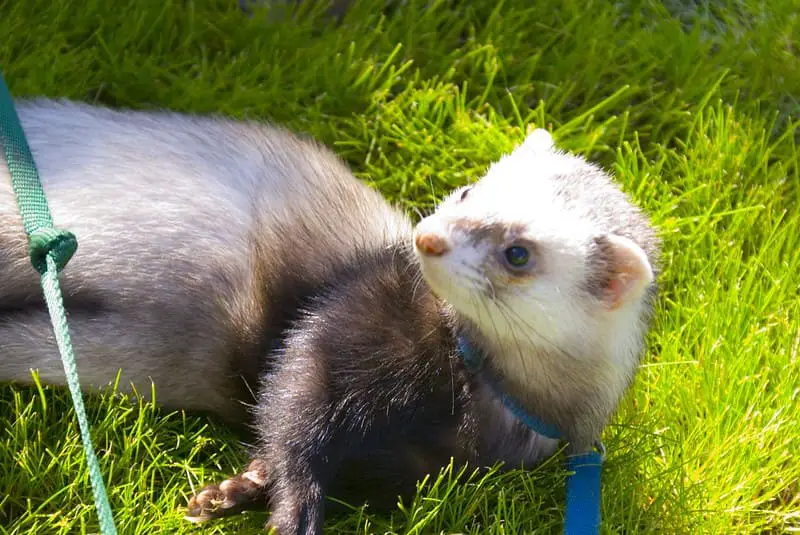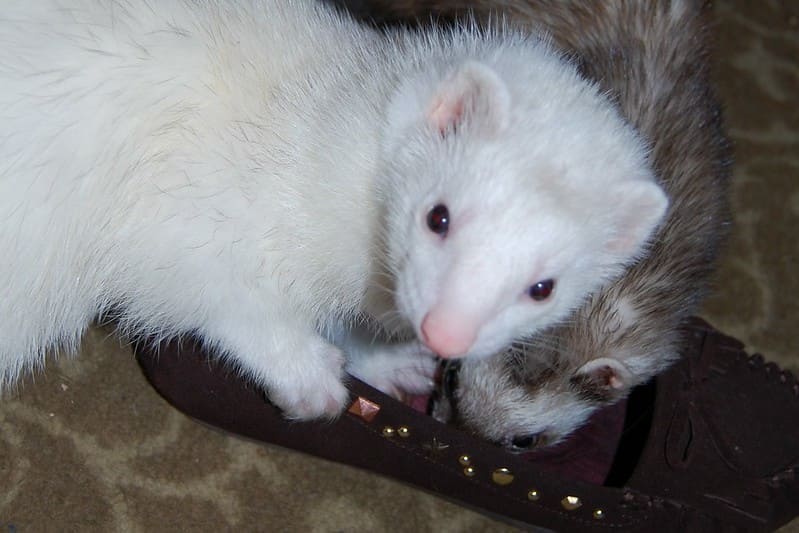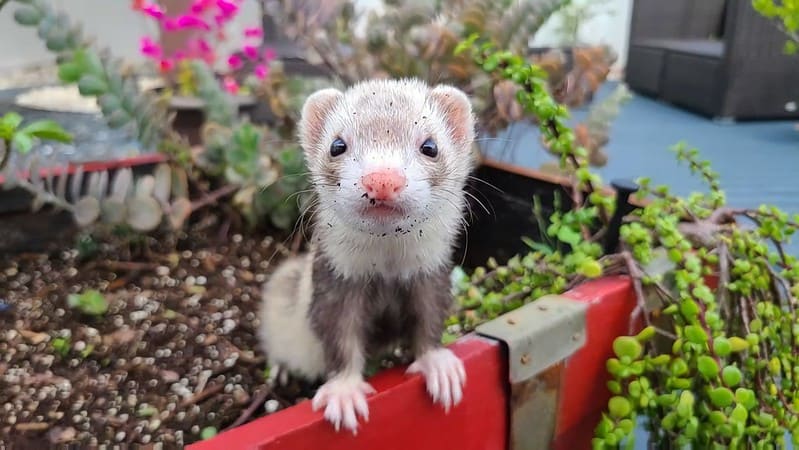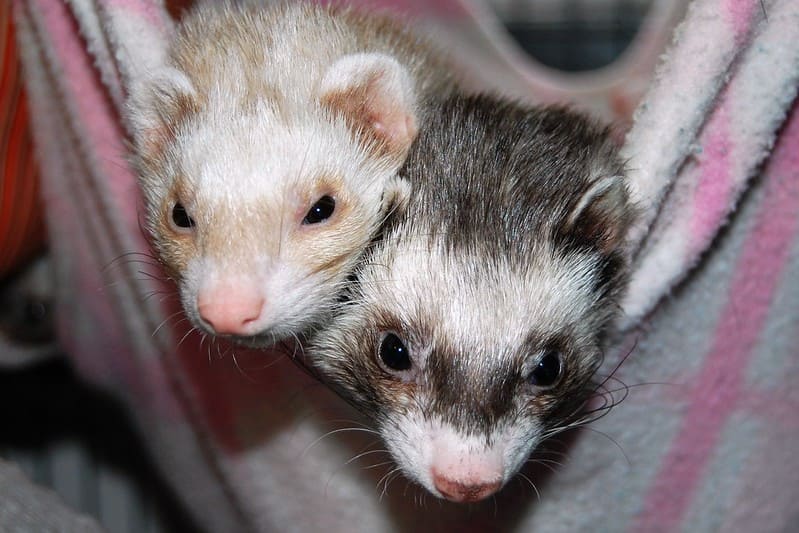Ferrets, the small, playful, and curious members of the Mustelidae family, are known for their captivating charm and unique personality. People often find themselves drawn to these enchanting creatures, but when considering adopting a ferret as a pet, many questions arise. One common query is whether ferrets are difficult to keep. In this comprehensive exploration, we will delve into the world of ferrets, covering their characteristics, care requirements, and potential challenges to provide a detailed answer to this intriguing question.

Understanding Ferrets
Ferrets are domesticated carnivores, closely related to weasels and otters. They have a long, slender body, a sleek coat, and a playful nature. These inquisitive animals are known for their energy and curiosity, often engaging in mischievous antics that endear them to their human companions. However, it’s important to note that these very characteristics can also pose challenges for ferret owners.
Ferret Characteristics
Ferrets are obligate carnivores, which means their diet primarily consists of animal protein. In the wild, they prey on small mammals and birds. This carnivorous nature has led to specific adaptations in their physiology, including a short digestive tract, designed to efficiently process and absorb nutrients from meat.
Physical Characteristics
Ferrets typically weigh between 1.5 to 4 pounds and have a lifespan of 6 to 10 years. Their fur can come in various colors and patterns, ranging from sable and albino to silver and cinnamon. Their long, flexible bodies are built for agility and exploration, often described as snake-like due to their length and agility.
Playful Nature
One of the endearing traits of ferrets is their playfulness. They are like perpetual kittens, constantly curious and eager to explore their surroundings. This characteristic often leads to amusing antics, with ferrets engaging in games of hide and seek or stealing and hoarding objects like socks or keys.
Sociability
Ferrets are highly social animals and often enjoy the company of their fellow ferrets. Keeping more than one ferret can be beneficial for their mental well-being, but it’s crucial to introduce them gradually to avoid conflicts. This social aspect of their nature can be both rewarding and challenging for owners.

Caring for Ferrets
Caring for a ferret involves several aspects, including providing shelter, nutrition, healthcare, and meeting their social and mental needs. Let’s break down each of these components to better understand the responsibilities of ferret ownership.
Shelter
Ferrets require a safe and comfortable living space. Many ferret owners choose to house their pets in specially designed ferret cages or multi-level enclosures that provide ample room for play and exploration. These cages should be escape-proof, as ferrets are notorious escape artists, and they should have appropriate bedding and hiding spots.
Cage Considerations
Ferret cages must be spacious and multi-tiered, allowing them to climb, explore, and engage in their natural behaviors. Many ferret owners opt for cages with ramps, shelves, and hammocks to keep their pets mentally and physically stimulated.
Ferret-Proofing Your Home
Even with a suitable cage, ferrets need time outside of it to roam and play. However, they are masters of escaping and getting into tight spaces. Ferret-proofing your home is essential to ensure their safety and prevent them from damaging your belongings.
Social Needs
As highly social animals, ferrets thrive when they have the company of their kind. While it’s possible to have a single ferret, they often enjoy companionship. However, introducing new ferrets to your household should be done with care to prevent territorial disputes.

Nutrition
Proper nutrition is essential for the health of your ferret. They are obligate carnivores, which means their diet should primarily consist of meat-based protein. Commercial ferret kibble is widely available and formulated to meet their dietary needs.
Diet and Feeding Schedule
High-quality ferret food contains around 32-40% protein and 18-22% fat, making it significantly different from cat food, which does not provide the necessary nutrition for ferrets. Feeding your ferret a balanced diet is crucial for their well-being.
Treats and Supplements
Supplementing their diet with occasional treats and fresh meat can be a delightful experience for both you and your ferret, but it should be done in moderation. Avoid feeding them fruits, vegetables, or dairy products, as these can upset their sensitive digestive systems.
Healthcare
Ferrets require regular veterinary care, including vaccinations and check-ups. They are susceptible to certain diseases, such as canine distemper and heartworms, and these can be life-threatening if left untreated. Neutering or spaying is also essential to prevent unwanted pregnancies and mitigate some behavioral issues.
Common Health Concerns
Ferrets are prone to certain health issues, including adrenal gland disease, insulinoma, and gastrointestinal blockages. Understanding these potential problems and seeking prompt veterinary care is essential to keep your ferret healthy and happy.
Vaccinations
Vaccinations are crucial to protect ferrets from diseases like canine distemper and rabies. Regular veterinary visits ensure that your ferret’s vaccinations are up to date.
Neutering and Spaying
Neutering or spaying your ferret is not only essential to prevent unwanted litters but also helps reduce certain behavioral problems and health risks. It’s a common practice for responsible ferret owners.

Grooming and Hygiene
Ferrets are generally clean animals and groom themselves frequently. However, they can benefit from occasional baths to keep their fur and skin healthy. It’s crucial to use a mild, ferret-specific shampoo and ensure thorough rinsing to prevent skin irritation.
Odor Control
Ferrets have scent glands that produce a musky odor, which can be noticeable. Some ferret owners opt to have these scent glands removed in a procedure called descenting, which is a matter of personal preference and sometimes a legal requirement in some regions.
Litter Training
Litter training your ferret is an essential aspect of maintaining cleanliness in your home. While they can be trained to use a litter box, accidents can still happen, and diligent cleaning is necessary.
Exercise and Mental Stimulation
Ferrets are highly energetic creatures and require ample opportunities for exercise and mental stimulation. They love to explore, dig, and play, so providing them with toys, tunnels, and interactive games is vital. Failure to do so can result in boredom and behavioral issues.
Playtime
Regular playtime outside of their cages is crucial for your ferret’s well-being. This helps them burn off excess energy and satisfy their natural curiosity.
Safety Concerns
When allowing your ferret to roam, it’s essential to ensure a safe environment. They may chew on or ingest items that could harm them, so ferret-proofing the space is crucial.
Mental Enrichment
In addition to physical exercise, ferrets also need mental stimulation. Puzzle toys and interactive games can keep their minds active and prevent boredom.

Challenges of Ferret Ownership
Now that we’ve covered the essential aspects of caring for ferrets, let’s explore some of the challenges that come with ferret ownership.
Odor Management
Ferrets have a distinctive musky odor that can be off-putting to some people. While descenting and regular grooming can help reduce this odor, it’s important to be prepared for the possibility that your ferret will always have a certain scent.
Escapism
Ferrets are expert escape artists. They can squeeze through surprisingly small openings and disappear into hidden nooks and crannies. Ferret-proofing your home is essential to prevent escapes and protect your furry friends.
Health Concerns
Ferrets are susceptible to certain health issues, including adrenal gland disease and insulinoma. Veterinary care and regular check-ups are crucial to catch and address these conditions early.
Short Lifespan
Ferrets have a relatively short lifespan, usually ranging from 6 to 10 years. This means that, as a ferret owner, you will likely face the heartache of saying goodbye to your beloved pets relatively soon.
Social Nature
While ferrets’ social nature can be a benefit, it can also be a challenge. They thrive on interaction with their human family members and fellow ferrets. If you can’t provide them with sufficient socialization and playtime, they may become bored or anxious.
Conclusion
So, are ferrets difficult to keep? The answer depends on your willingness to meet their unique needs and your capacity to adapt to their playful, mischievous nature. Ferrets can be rewarding and delightful pets for those who are well-prepared and committed to providing the necessary care, but they do come with challenges that prospective owners should be aware of. If you have the time, patience, and affection to share with these charming creatures, you may find that the joys of ferret ownership far outweigh the difficulties.
